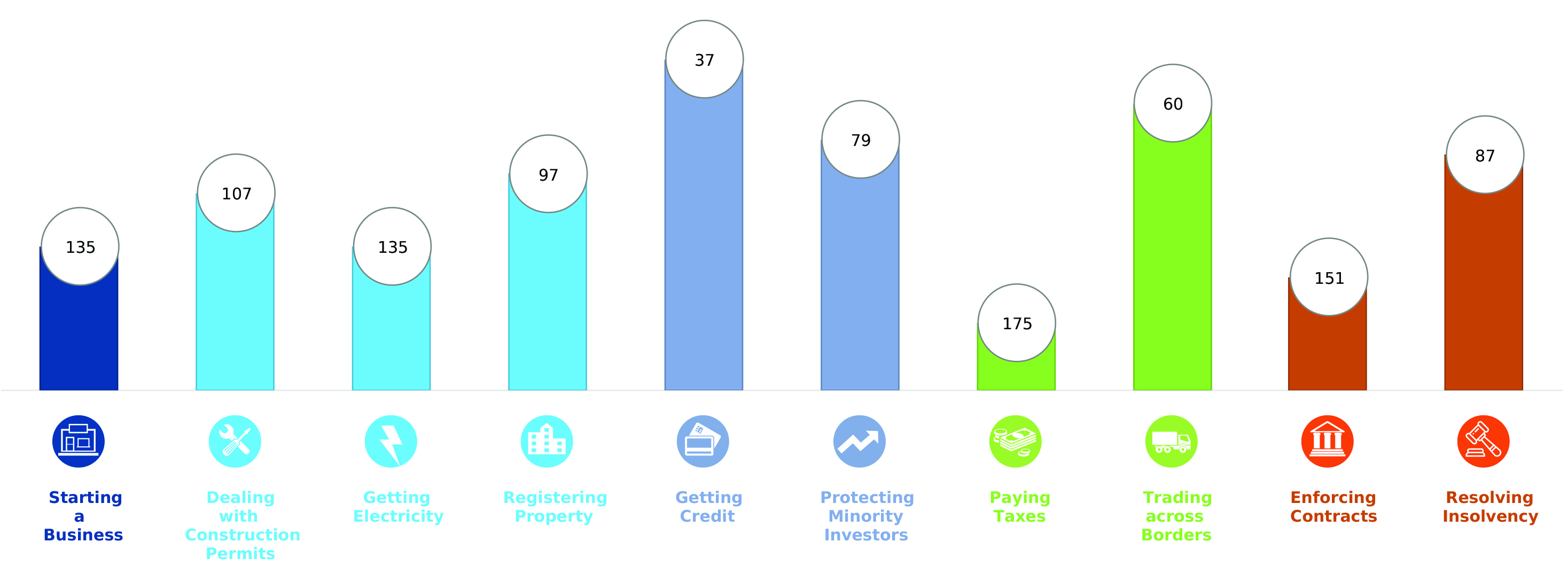Is Nepal Easy to Enter as a Small Company
Nepal has jumped to an all-time high of 94 out of 190 economies in the World Bank's ease of doing business rankings, on the back of improved credit information availability, easier cross-border trade, and enforcement of contracts.


It is the biggest leap—of 16 places—the country has made in over a decade in the rankings. Last year, it was ranked 110th, just one point above its 2008 ranking, displaying barely any progress in 10 years when it came to doing business in the country. Nepal fell five places from 105 in 2018 to 110 in 2019, prompting the government to hold multiple meetings with World Bank officials and seek suggestions on areas that needed to be prioritised to improve the ease of doing business.
Among the 10 indicators used by the World Bank to calculate the ranking, Nepal scored highest on access to credit information—37th out of 190—as it has improved access by expanding the coverage of the credit bureau, according to the report published on Thursday. Nepal also ranked relatively high on cross-border trade—60th out of 190—as it has reduced export costs and improved import times by opening the Birgunj Integrated Check Post.
According to bankers, expansion of parameters and robust functioning of the Credit Information Bureau, which oversees the credit functions of 116 banks, financial institutions and debt seekers, helped push Nepal up the rankings.
"Consumers have faster and easier access to credit and they enjoy reduced costs of borrowing in case of demonstrated credit performance," said Manoj Gyawali, CEO of Jyoti Development Bank. "Improved access to accurate and reliable credit information for lenders has also enabled them to make more informed credit decisions."
This availability of consolidated credit information has reduced processing times and costs for lenders and financing costs for borrowers, according to Gyawali.
Financial institutions have also opened 2,000 new branches in over a year while commercial banks have expanded branches to 739 out of 753 local units, leading to the increased flow of banking information, according to the Nepal Rastra Bank data.
Despite this overall progress, Nepal is still poorly ranked, in 135th position, when it comes to starting a business. The country has made things more difficult, according to the World Bank, by requiring an in-person follow-up for employee registration for social security.
As per the report, it takes an average of 22.5 days to complete eight procedures for starting a business, at a cost of 20.2 percent of income per capita. Business in high-income OECD countries can be started in nine days through five procedures and at a cost of just 3 percent of income per capita. The country has also made paying taxes more difficult with the introduction of new gratuity contributions by employers.
Amid better ranking but difficulties in starting businesses and paying taxes, economists and analysts say that the improved rank can be attributed to procedural ease rather than the implementation of regulations.
According to Chandan Sapkota, an economist, when compared to Nepal's previous records, an improvement on the Doing Business score is a good signal for investors. But when compared to other economies, Sapkota says the country still has a lot more to do.
"The government should be credited for bringing in procedural changes but will it drive investment growth?" said Sapkota. "The report measures procedural changes but not the quality and efficiency of the implementation of structural reforms in tax regimens and in starting a business."
The report comes at a time when the economy is recovering from a slump in foreign direct investment. Data from the central bank shows that investment in Nepal fell to $10.9 million in the first two months of the 2018-19 fiscal year, from $49.8 million in 2017-18. In the first two months of this fiscal year, the country has witnessed an increase of 61.2 percent in direct investment, measured at $17.6 million.

According to Bishal Chalise, another economist, the report measures changes in regulation and since Nepal has reformed dozens of laws related to business, that helped push up the country's rank.
"The report does not account for the level of corruption and the existing level of investor confidence, which are major factors affecting the investment climate," said Chalise. "Nepal has reformed a dozen laws over the last year but has that translated into increased business confidence, heightened perception about the investment climate and proper structural reform? Maybe not."
Nepal enacted several new laws, including the Foreign Investment and Technology Transfer Act, Industrial Enterprise Act and Special Economic Zone Act, intended to attract increased foreign investment last year.
Government officials agree that the doing business index has improved primarily due to regulatory reforms.
"Nepal has amended laws pertaining to labour and technology transfer to improve the investment climate, and it is engaged in making policy and process-level changes to improve the condition of doing business in the country," Pushpa Raj Kadel, vice-president of the National Planning Commission, said at the recently held Infrastructure Summit. "Investors from China, India, the US and Norway, among others, are interested in investing in Nepal."
But analysts say otherwise.
According to Semanta Dahal, an advocate and legal policy expert, steps being undertaken to pass new laws on foreign investment may have contributed to a gain of a few points but questions remain if the increase accurately reflects Nepal's business environment.
"The improvement in getting credit does not comprehensively indicate matters that have a negative effect in attracting new investment and setting up new businesses," said Dahal. "The report shows that Nepal has spiralled down in starting a business indicator from 107th to 135th, which reflects all the procedural delays and time-consuming processes that have always deterred investors in Nepal."
During the recent infrastructure summit, the Confederation of Nepalese Industries had complained that there was a huge funding gap in capital projects in the country and currently available financial instruments and modalities for investment in infrastructure were not adequate.
This shows that despite improvements in some sectors, primarily on the regulation side, the higher ranking has not translated into an investment-friendly environment, said analysts.
The index draws data from a questionnaire administered to professionals who oversee or advise on legal and regulatory requirements for doing business. According to the World Bank, most respondents are legal professionals such as lawyers, judges or notaries. In addition, officials of the credit bureau or registry complete the credit information questionnaire. Accountants, architects, engineers, freight forwarders and other professionals answer the questionnaires related to paying taxes, dealing with construction permits, trading across borders and getting electricity. This profile of respondents to the questionnaire perhaps accounts for the report's focus on regulatory measures over their implementation.
Out of the eight economies in South Asia, Nepal has been ranked third in this year's rankings, behind first-placed India and Bhutan.
echevarriaanterevell.blogspot.com
Source: https://kathmandupost.com/money/2019/10/24/is-doing-business-getting-easier-in-nepal
0 Response to "Is Nepal Easy to Enter as a Small Company"
Post a Comment